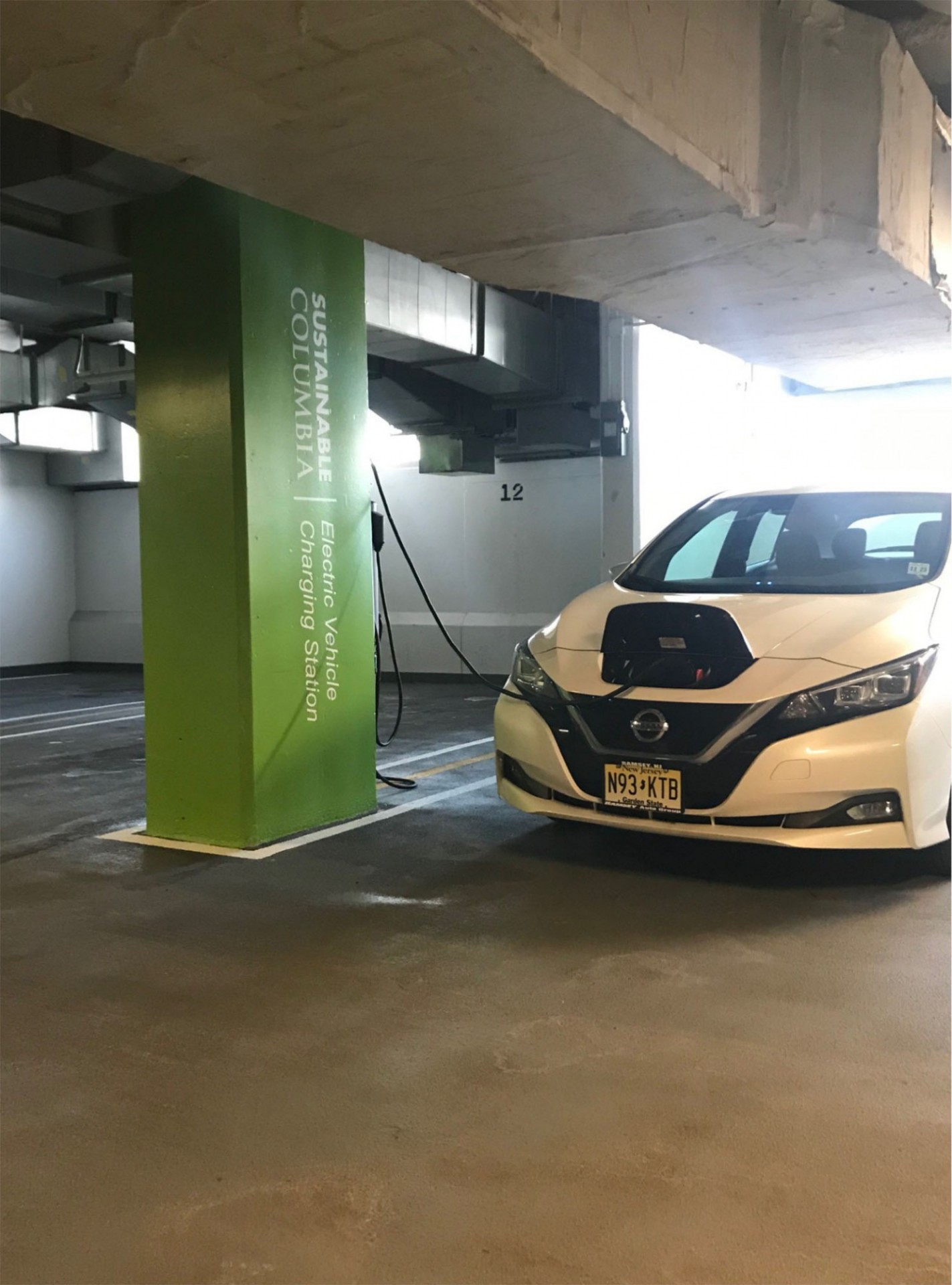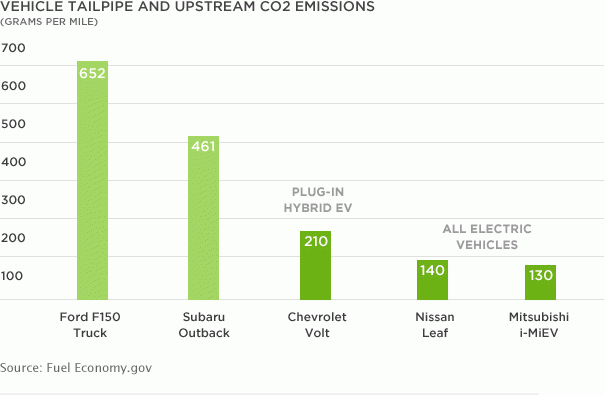Electric Vehicles
New York City is filled with accessible and sustainable travel options. Using alternative methods of transportation, like biking or public transit, to commute to Columbia’s campuses is one way to do your part to reduce emissions and help keep our neighborhoods safer, healthier, and greener. We encourage commuters to take advantage of public transportation, carpooling and vanpooling, and carbon-free transportation alternatives. If driving alone is absolutely necessary for you, transitioning to an electric vehicle is a way to make your travel more environmentally friendly.
Electric vehicles have many advantages including incredibly low operating costs. In 2019, for example, the New York City government spent between $204 and $386 maintaining each of its electric cars, compared to $1,600 spent for the average gas powered vehicle. For the average consumer, electric vehicles mitigate most of the cumbersome maintenance and fuel costs associated with internal combustion engines.
Electric vehicles encourage energy independence and reduce greenhouse gas emissions from the transportation sector, especially when the energy used to charge your electric vehicles at home comes from renewable sources. They provide a very tangible means through which you can make your commute more environmentally friendly!
This interactive online tool shows popular electric car models graphed by their average monthly costs compared to their greenhouse gas emissions.
Electric vehicles also have a number of public health benefits. Pollutants from internal combustion engines can trigger symptoms for individuals with respiratory or cardiovascular illnesses, sometimes even contributing to premature death. These health effects are often most heavily borne by marginalized individuals in lower-income neighborhoods. Driving an electric vehicle doesn’t just help the natural environment, but it makes New York City a healthier place, especially for our neighbors who have been historically discriminated against.
The electric vehicle marketplace is growing! Purchasing an electric vehicle instead of a gas powered car is becoming increasingly more common and accessible. Doing so helps the environment, our community, and is a financially sound choice.
A number of federal and local programs make purchasing an electric vehicle easier and more affordable.
New York State residents are eligible for the drive clean rebate program. “Open to all New York State residents, the Drive Clean Rebate offers a point-of-sale rebate towards the purchase or lease of a new electric car. Taking advantage of the Drive Clean Rebate is very easy: simply purchase a qualifying electric car from a participating dealer, and a discount of up to $2,000 will be applied when you pay.” Read more about the Drive Clean Rebate and see a list of qualifying vehicles on the New York State Energy Research and Development Agency (NYSERDA) Website.

Additionally, the federal government provides a tax credit for purchasers of new electric vehicles. “All-electric and plug-in hybrid cars purchased new in or after 2010 may be eligible for a federal income tax credit of up to $7,500. The credit amount will vary based on the capacity of the battery used to power the vehicle.” The federal tax credit applies in conjunction with any additional state incentives. To view the credits apportioned for different electric vehicles on the market, go to the Department of Energy’s Fuel Economy website.
The New York State Green Pass Discount Plan also offers a financial benefit to drivers of electric and hybrid electric cars who commute from outside of the city. The initiative provides a 10% discount on New York tolls for qualifying energy efficient vehicles, including most popular electric car options in the market.
For more electric vehicle incentives outside of New York State, see the Department of Energy’s Alternative Fuels Data Center.
Click here to see and compare electric vehicles in the marketplace, and view this PDF for information on buying used electric cars.
Introduction to Electric Vehicle Charging Stations:
There are three types of electric car charging stations in common use throughout the United States: Type 1, 2 and 3 charging stations. While all three require the use of a charging cord and plug, they vary in terms of charging speed and functionality.
Type 1 charging stations are the easiest to install. All they require is a charging cord and access to a typical household 120 volt outlet. When you buy an electric car, the company from which you bought it will provide you with a Type 1 charging cord. Type 1 ports charge between 3 and 5 miles per hour and can provide a full charge when left plugged in overnight.
Type 2 charging stations charge more quickly than Type 1 stations; instead of connecting to 120 volt outlets, they connect to 240 volt ports. That said, Type 2 charging stations charge at a rate of around 10 to 20 miles per hour. Type 2 charging ports are typically found at commercial charging stations and in commuter garages.
Type 3 charging stations, also known as Direct Current Fast Charging (DCFC) stations, are the fastest plug in charging option for electric vehicles. Using 480 volt power, DCFC stations can provide a full charge in 30-60 minutes. DCFC stations are considerably more expensive than Type 1 and 2 charging stations, and are less commonly available in public charging stations.
Columbia’s electric vehicle charging ports are only available to people who are eligible and purchase parking in those garages, except for visitors to the Lamont campus. The information below is offered to visitors of Columbia and Columbia affiliates who are seeking to EV charging options, but do not have access to Columbia’s EV charging ports.
Morningside campus area
- Riverside Garage: 480 Riverside Dr, New York, NY 10027 (120th St. entrance), Phone: (212) 870-6736
- GMC Garage at 532 W 122nd St, New York, NY 10027, Phone: (212) 961-1075
CUIMC campus area
- Park It, 528 W 162nd Street, Phone: (212) 929-9404
- Curbside, 115 Fort Washington Ave, New York, NY 10032, USA
More electric vehicle charging resources
For a more up to date and comprehensive view of publicly available charging ports in NYC and across America, including private residential plugs that can be shared, view the PlugShare map: https://www.plugshare.com/
Learn about NYC’s curbside electric vehicle charging port rollout: https://www1.nyc.gov/html/dot/html/motorist/electric-vehicles.shtml#/find/nearest
Morningside campus
Below-grade parking at Morningside campus are equipped with Level 2 electric vehicle charging stations in both commuter and 24-hour parking garages. These charging stations are free for use and only available to parking permit-holders. The electric vehicle ports are ChargePoint duel ports and located in Engineering Terrace, International Affairs Building, and 560 Riverside Drive garages.
CUIMC
Electric vehicle charging at CUIMC is free of charge for permit-holders and located in the following parking areas: School of Nursing garage, 100 Haven parking garage, and the Irving Cancer Research Center garage.
Manhattanville campus
In 2023 Columbia will add Level 2 electric vehicle charging to its garage at 635 West 131st Street.
Lamont-Doherty Earth Observatory
Level 2 electric vehicle charging is available at the Lamont campus for use by visitors and Columbia employees with approval to access the Lamont campus. The charging outlets are located next to Borehole and Oceanography buildings. There is a fee to charge. More information can be found at here: https://lamont.columbia.edu/campus-services/parking-visitor-policy



